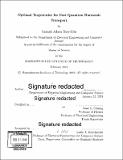| dc.contributor.advisor | Isaac L. Chuang. | en_US |
| dc.contributor.author | Buercklin, Samuel Adam. | en_US |
| dc.contributor.other | Massachusetts Institute of Technology. Department of Electrical Engineering and Computer Science. | en_US |
| dc.date.accessioned | 2019-07-17T20:58:59Z | |
| dc.date.available | 2019-07-17T20:58:59Z | |
| dc.date.copyright | 2019 | en_US |
| dc.date.issued | 2019 | en_US |
| dc.identifier.uri | https://hdl.handle.net/1721.1/121733 | |
| dc.description | Thesis: S.M., Massachusetts Institute of Technology, Department of Electrical Engineering and Computer Science, 2019 | en_US |
| dc.description | Cataloged from PDF version of thesis. | en_US |
| dc.description | Includes bibliographical references (pages 85-88). | en_US |
| dc.description.abstract | The transport of atomic ions trapped within a harmonic potential arises necessarily in the course of building a trapped ion quantum computer. We may define this problem in terms of a differential equation and its corresponding boundary conditions to satisfy which are sufficient to guarantee the motional quantum state of the ion is unaltered. However, the solution space to this problem is uncountably large, and the various solutions differ in many qualitative and quantitative aspects. We present an easily-computed functional of transport trajectories with intuitively interpretable terms which may be used to compare solutions to the quantum harmonic transport problem, but does not require an expensive quantum-mechanical simulation of the ion dynamics. Furthermore, we prove the convexity of this cost function under easily satisfied conditions in a Fourier Series parameterization of the problem. We then numerically optimize the cost function to discover optimal trajectories for the quantum harmonic transport problem. | en_US |
| dc.description.statementofresponsibility | by Samuel Adam Buercklin. | en_US |
| dc.format.extent | 88 pages | en_US |
| dc.language.iso | eng | en_US |
| dc.publisher | Massachusetts Institute of Technology | en_US |
| dc.rights | MIT theses are protected by copyright. They may be viewed, downloaded, or printed from this source but further reproduction or distribution in any format is prohibited without written permission. | en_US |
| dc.rights.uri | http://dspace.mit.edu/handle/1721.1/7582 | en_US |
| dc.subject | Electrical Engineering and Computer Science. | en_US |
| dc.title | Optimal trajectories for fast quantum harmonic transport | en_US |
| dc.type | Thesis | en_US |
| dc.description.degree | S.M. | en_US |
| dc.contributor.department | Massachusetts Institute of Technology. Department of Electrical Engineering and Computer Science | en_US |
| dc.identifier.oclc | 1102049640 | en_US |
| dc.description.collection | S.M. Massachusetts Institute of Technology, Department of Electrical Engineering and Computer Science | en_US |
| dspace.imported | 2019-07-17T20:58:57Z | en_US |
| mit.thesis.degree | Master | en_US |
| mit.thesis.department | EECS | en_US |
